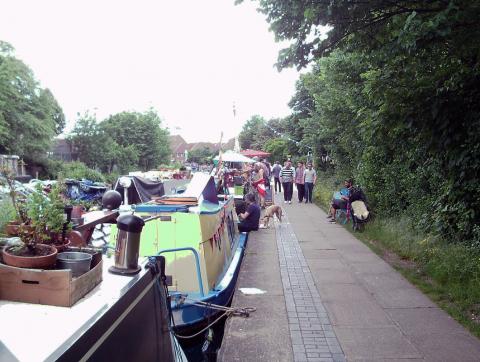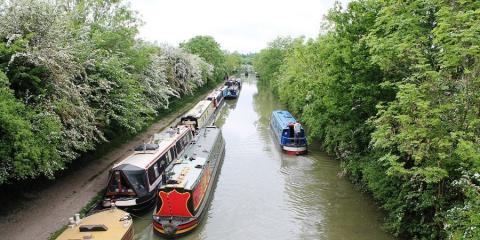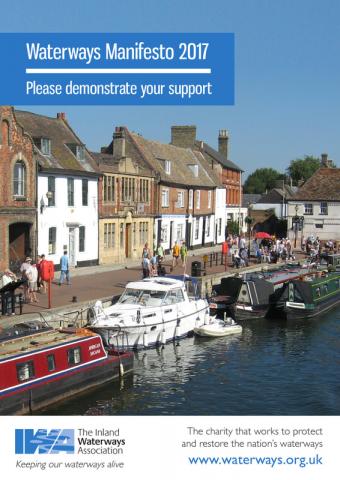C&RT ignores early licence consultation results in Stage 3 survey
October 2017 - With licence fees set to rise three per cent, it seems boaters have presented Canal & River Trust with a surprisingly united front in response to what many see as a completely unnecessary consultation on licence fees. Despite that, it is still struggling to impose its own views, as Peter Underwood observes.
The first two stages of the consultation came back with some pretty clear responses, with most feeling there was no need for change – to the extent that the report on Stage Two findings carefully fails to enumerate anything, typically saying things like: “Some felt it is appropriate as it stands whilst others identified a range of possible improvements.”
Despite that the cautious wording of the report on the second stage it was forced to make one thing clear: “Boaters were adamant that the licensing system should not be used to penalise specific types of boating or set different types of boater against each other.”
The second stage showed there was broad support for licensing by area of boat (length x width), though this view was not unanimous – but there was 'no widespread support for regional pricing or zoning; the use of technology; the level of use of a boat'.
As the stage two report says: “There was a strongly and widely held view that congestion is a problem of mooring and enforcement, and not something for the licensing system to resolve, though there were a few voices who did see a role for licensing in managing capacity.”
C&RT has now launched Stage three with an email survey to all customers – and that survey makes it clear that it wants to go places where boaters don't.
Despite the clear message that no boater should be discriminated against it still wants to discus: 'Considerations of the different impacts from, and challenges faced by, those with or without a home mooring'
The IWA's manifesto - they are the only organisation wanting discrimination against CCers
According to C&RT's stage three survey: “Mooring fees are often significantly more than the licence fee, and some boaters argued that it would be fair to charge a higher licence fee for those without a home mooring, especially as those without a home mooring would, typically (not having access to mooring facilities), be more likely to use the facilities provided by the Trust.”
Of course, it is only the Inland Waterways Association (IWA making that argument and most other participants in the early stages of the consultation were clear that the waterways are always there for people who wish to use them, even if they choose to use them infrequently, and that the licence cost should reflect this availability.
Despite the clear position from the early stages that boaters did not want discrimination against any particular type of boater C&RT is still asking participants in its stage three survey to rate the fairness of three options.
a) Retain the current arrangement with a single licence fee whether with or without a home mooring
b) Introduce over time a higher fee for boats without a home mooring
c) Introduce – at a higher fee – a new licence that would permits boats without a home mooring to remain within a limited area (provided they satisfy the Trust concerning their bona fide navigation).
Even though the message was clear that 'most of the participants in previous stages felt that busy areas are exacerbated by poor mooring provision and limited enforcement powers' and C&RT admits: “They see the challenge as a moorings issue and do not think licensing is an effective or suitable way to address the relative appeal of London and other parts of the south where housing costs make living aboard a canal boat attractive,” the charity can't accept that.
It says: “The Trust is interested in exploring how the licensing structure might reflect the relative attraction of the most busy and popular parts of the network where the growth in boats without a home mooring, and their impact, are greatest.
“We acknowledge that most participants did not want to use the licence fee to address what they perceived to be a mooring or enforcement issue and as such will not consider this further with respect to this consultation.
“However, with mooring inherently constrained in the busiest locations, and limitations on what can be achieved via enforcement, the Trust will undertake further work outside of the licence review process to develop possible options.”
Which is a long winded way of saying we have heard what you have said and have decided we know better.
Of course the questions about penalising continuously cruising boats come at the end of the long survey document which one experienced boater described as: “A series of questions along the lines of 'When did you stop beating your wife?'”
The rest asks boaters views on charging by length or area with an idea that wasn't even discussed in earlier stages of a surcharge on all boats above the standard narrowboat width.
It also asks about discounts for various categories of boats and hints very strongly that C&RT wants to dump the prompt payment discount in its present form saying: “It was introduced at a time when there was a significant issue with late and non-payment of licence fees and as such, as a clear incentive for customers to pay early.” and arguing that is no longer a problem.
“Since the discount was introduced, the issue of late and non-payment has largely been addressed, and there are many easier ways for customers to pay for a licence,” says C&RT.
It wants boaters to choose between:
Removing the Prompt Payment discount entirely;
Reducing Prompt Payment discount phased over a period of time;
Reduce the Prompt Payment discount and change it so that part of discount is applied for prompt payments and part of the discount is applied to encourage automatic methods that reduce administration costs to the Trust.
There doesn't appear to be an option to keep it.
As C&RT admits: “Short-term licences were not discussed during stage 1 or 2. Despite that it wants: “... to give people the opportunity to comment on our proposal for short-term licences and to suggest other approaches.
Its proposal is for three short term licence options: one week, or one month, or thirty day explorer - all priced proportionately higher than a full licence to 'reflect the greater administrative costs.'
Some consultation.
--------
When this article was first published in The Floater, readers were invited to comment. The following contributions seemed pertinent:
By Alison Tuck on 17/10/2017 -
"I sit on the Navigational Advisory Group Mooring & licencing (For CRT) we have been involved in advising CRT on this consultation. All through Stage 1 & 2. It was felt to be a balanced approach. Then we get to stage 3 Our last meeting 1 day before they sent out the survey. We (NAG) weren't shown the questions or the proposals in it. Instead we had a discussion about Asset Management. This was a deliberate because I believe they didn't get the results they wanted from stage 1&2 so by passed NAG for stage 3 bacause they new what our opinions would be. The have marginalised the advisory groups and are now marginalising boaters and boaters views. "
By Peter Underwood on 18/10/2017 -
"Letter from National Association of Boat Owners to members today:
Dear Member
Your Council met recently and felt that we should urgently communicate our views and recommendations with regard to CRT's latest consultation.
Canal and River Trust have spent considerable time and expense getting to this stage yet in our view have now effectively ignored the majority view. CRT have in this consultation posed questions intimating that these have the support of the two earlier stages and of the Navigation Advisory Group (NAG L&M) where boaters views were requested. This is not the case.
At the specially convened meeting of NAG and the boaters representatives (Mark Tizard and Alison Tuck from NABO attended) we were advised that after getting the views of the boating organisations (stage 1) and the boaters workshops (stage 2) the only common themes emerging were the approval to change the way licensing was charged from length to area and to review discounts generally (keeping the prompt payment discount). We understood that this basically was likely to form the core of the questions to be asked. There was a majority view that there should just be one license charge (regardless of whether a boater had a home mooring or not) and it was agreed that licencing cost should not be used to address congestion but that this was the function of enforcement. Despite being rejected at stage 1&2 this was brought up again at the special NAG meeting and again rejected unanimously.
Despite this we note with dismay that CRT have chosen to be divisive and have included questions that suggest that the boaters should pay a different fee dependant upon whether they have a home mooring or not, see questions 24,25 and 26. NABO's view is that there should be one license fee for use of the waterways under CRT's control and would urge members to vote accordingly. In addition we note that CRT in question 24 is suggesting a new license with increased fee (in our view potentially illegal unless there is a new act of parliament) for boats that wish to remain in one area. This is in our view a function of creating a sustainable mix of towpath, short and long term moorings supported by enforcement.
Members can read a pdf of the consultation here.
We would URGE all members to respond to the consultation, if you have not received a copy contact customer services who will email or post one out to you.
NABO is planning to launch a wider campaign shortly whose aims are to ensure that CRT and EA put boating and boaters at the forefront of their
thinking and actions when promoting the waterways. This will have the tag of ' As a boater are you feeling marginalised ?'
NABO Council "
--------
Photos: (1st) London boaters remain a target for C&RT despite the consultation, (2nd) The Leicester Line - suffering long term closures because of water supply problems, (3rd) The IWA's manifesto - they are the only organisation wanting discrimination against CCers.








